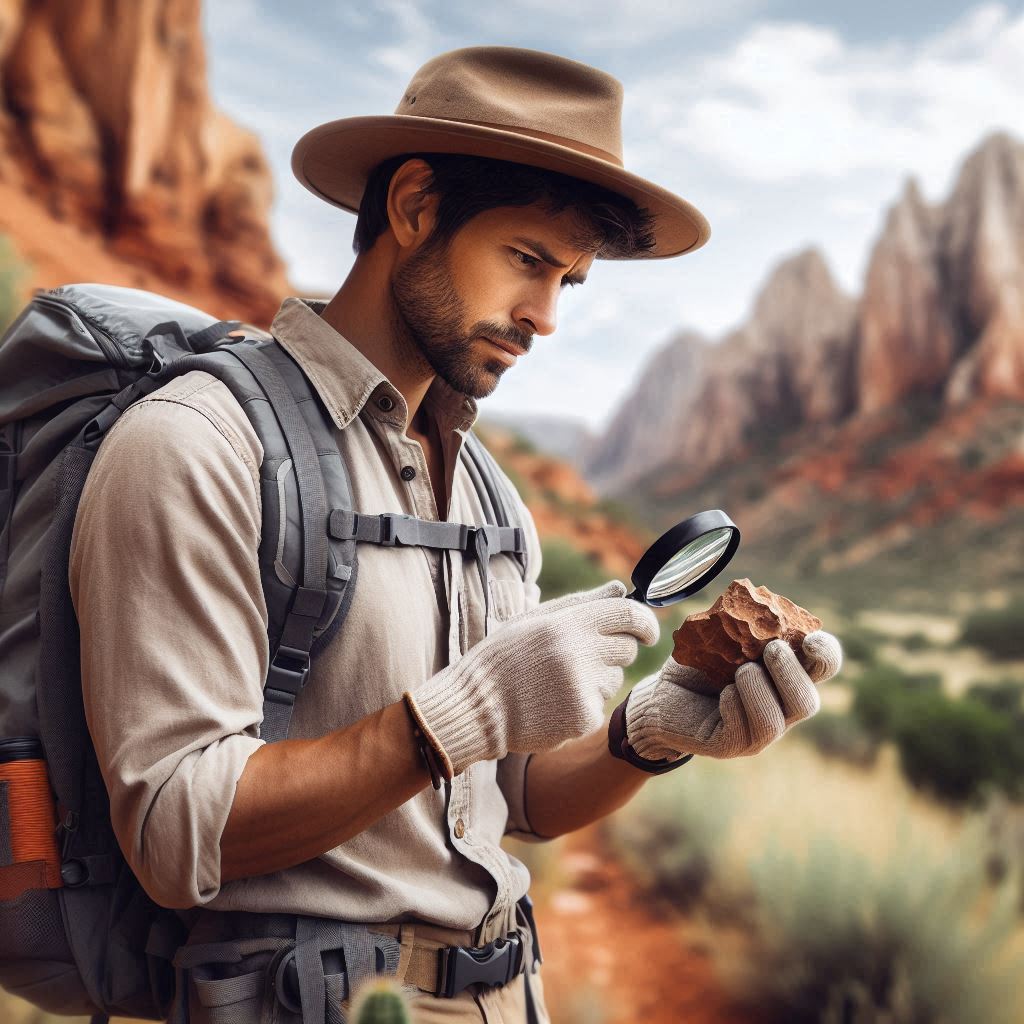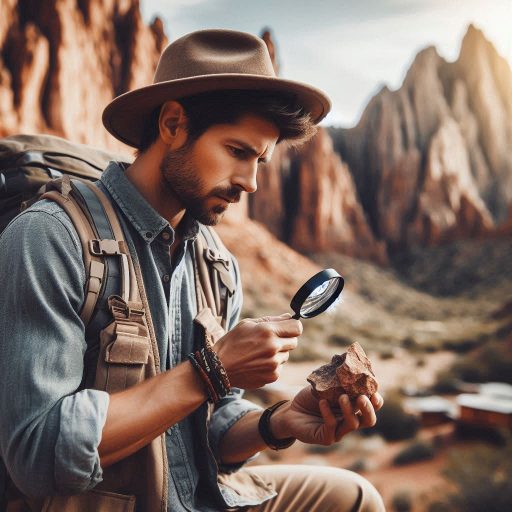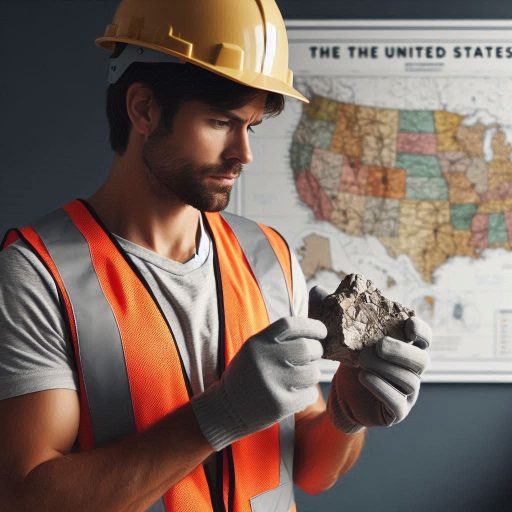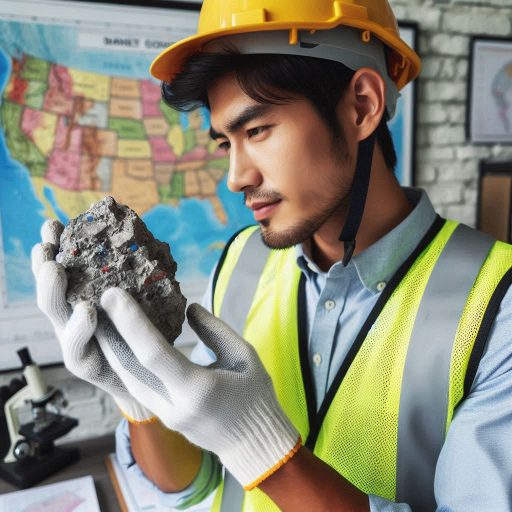Introduction
Geology field trips offer hands-on learning experiences outside the classroom.
They allow students to explore geological formations, rock types, and environmental processes in real-world settings.
These excursions make geology come alive, fostering a deeper understanding of the subject.
Field trips play a crucial role in geology education.
They provide students with opportunities to observe geological features firsthand.
Students develop essential skills, such as mapping, sampling, and data collection, which are vital in geology.
Fieldwork enhances critical thinking and problem-solving abilities by encouraging students to analyze geological phenomena in context.
In this blog post, we will explore the various benefits of geology field trips.
We will discuss how these trips enhance classroom learning and improve student engagement.
We will highlight different types of geological sites that make great field trip destinations.
Additionally, we will cover how to prepare for a successful field trip, including what to bring and how to stay safe.
By the end of this post, you will understand why geology field trips are educational and exciting.
You will be inspired to take your geology education outside the classroom and explore the wonders of our planet.
Importance of Geology Field Trips
Hands-On Learning Experience
Geology field trips offer students a hands-on learning experience that brings textbook concepts to life.
Instead of just reading about rock formations, students directly observe them in the field.
This tactile approach helps solidify understanding by allowing students to see and touch various geological features.
Collecting rock samples, observing layers, and analyzing geological structures gives students a deeper connection to the material.
On a field trip, students can perform geological tests and measurements.
These real-world tasks improve their skills and give them confidence in their abilities.
The immersive experience of working in the field also enhances critical thinking and problem-solving.
Students gain practical insights by applying theoretical knowledge to real-life geological situations.
Practical Application of Classroom Knowledge
Field trips provide a unique opportunity to apply classroom knowledge in real-world settings.
Concepts like stratigraphy, mineral identification, and faulting become clearer when observed in nature.
This practical application reinforces classroom learning, making abstract ideas more tangible and understandable.
For example, students can directly observe geological layers and formations instead of looking at illustrations or diagrams.
They learn how these formations tell a story about the earth‘s history.
Students can also practice using field equipment like compasses, rock hammers, and geologic maps.
This hands-on application of skills builds technical proficiency and prepares students for future fieldwork.
Fieldwork also offers an opportunity for students to see geological processes in action.
For instance, a visit to a volcanic area allows students to witness rock formation and erosion in real time.
These experiences make geology more dynamic and engaging, encouraging a deeper interest in the subject.
Exploration of Real-World Geologic Features
Geology field trips introduce students to unique geologic features that cannot be replicated in a classroom.
Whether exploring mountains, caves, or coastlines, students encounter fascinating formations that reveal the earth’s dynamic processes.
Seeing these formations up close helps students understand how geology shapes landscapes over time.
For instance, visiting a sedimentary basin allows students to observe layers that tell a story about ancient environments.
Exploring a fault zone gives insight into tectonic activity and earthquake hazards.
Walking through a volcanic field demonstrates how magma reshapes the earth’s surface.
Each field trip offers a unique opportunity to study the natural world in its raw form.
These trips often expose students to diverse geological environments.
From deserts to forests, each location offers distinct geological characteristics.
By exploring various terrains, students gain a broader understanding of earth’s processes and the diversity of geological features.
Opportunity to Interact with Professionals in the Field
Field trips provide students with valuable opportunities to interact with experienced professionals.
Geologists, researchers, and field guides often accompany these trips, offering expert insights.
This interaction allows students to ask questions, gain mentorship, and learn directly from those working in the field.
Professionals can share their experiences, challenges, and career paths, providing inspiration and practical advice.
Students get a glimpse into what it‘s like to work as a geologist and understand the skills needed for success.
These connections can also lead to networking opportunities, internships, or future career prospects.
In short, geology field trips provide a rich educational experience, combining hands-on learning, practical application, exploration, and professional interaction.
Read: Challenges and Rewards: The Dual Life of an U.S. Environmental Scientist
Popular Geology Field Trip Destinations
National Parks with Unique Geologic Features
National parks are treasure troves of unique geological features.
Visiting these parks provides an excellent opportunity for education and exploration.
One must-see destination is Yellowstone National Park.
Here, visitors marvel at geysers, hot springs, and volcanic landscapes.
The geothermal activity showcases Earth’s inner workings and presents stunning visuals.
Another remarkable destination is the Grand Canyon National Park.
This park offers breathtaking views of layered rock formations.
The canyon reveals over two billion years of geological history.
Visitors can hike along the rim or venture down into the canyon itself.
Each step reveals the intricate processes that shaped this magnificent landscape.
Yosemite National Park features iconic granite cliffs and stunning waterfalls.
The towering El Capitan and Half Dome attract climbers and photographers alike.
These formations tell stories of glacial erosion and geological uplift.
Exploring Yosemite provides insight into the forces that shape mountains.
Geological Museums and Sites
Geological museums offer educational experiences for geology enthusiasts.
The American Museum of Natural History in New York houses extensive geological exhibits.
Visitors can learn about minerals, fossils, and Earth‘s history.
Interactive displays engage people of all ages.
The Smithsonian National Museum of Natural History in Washington, D.C., is another must-visit.
Its geology exhibits feature stunning mineral collections and fossil displays.
The Hall of Geology showcases the diverse processes that form our planet.
In addition to museums, several geological sites across the country are worth exploring.
The Petrified Forest National Park in Arizona displays ancient, fossilized trees.
These remarkable formations provide a glimpse into Earth‘s distant past.
The park’s vibrant colors and unique geological features make it a must-visit for geology enthusiasts.
Universities Offering Field Trip Programs
Many universities offer geology field trip programs to enhance student learning.
These programs provide hands-on experience and real-world applications.
Students study rock formations, fossils, and geological structures in various locations.
For example, the University of California, Berkeley, offers field trips to nearby geological sites.
Students explore the Sierra Nevada mountains, observing various rock types and geological processes.
These experiences solidify classroom learning and foster a deeper appreciation for geology.
Similarly, Colorado State University provides students with field trips throughout Colorado.
Students visit the Front Range and examine diverse geological features.
Fieldwork helps students understand geological principles in a practical setting.
International Locations with Diverse Geology
Exploring international locations broadens one‘s geological knowledge and experience.
Iceland is a fantastic destination for geology lovers.
The country‘s unique volcanic landscapes and geothermal activity are unparalleled.
Visitors can witness the Mid-Atlantic Ridge, where tectonic plates diverge.
Another incredible location is the Italian Dolomites.
This UNESCO World Heritage Site features stunning limestone formations.
The unique geology, coupled with breathtaking scenery, attracts geologists and hikers alike.
Visitors can hike through diverse landscapes and witness fascinating rock formations.
New Zealand also offers diverse geological features.
The North Island‘s geothermal regions and the South Island‘s fjords showcase a variety of geological processes.
Exploring these locations provides an enriching educational experience for anyone interested in geology.
Geology field trips offer both educational and exciting experiences.
Whether visiting national parks, museums, universities, or international locations, there is much to explore and learn.
Read: Job Market Trends: Future of Chemistry Jobs in America
Benefits of Participating in Geology Field Trips
Improved Understanding of Geologic Concepts
Geology field trips significantly enhance students‘ understanding of geological concepts.
Instead of just reading about rocks and formations, students observe them in person.
They explore various landscapes, such as mountains, rivers, and valleys.
This hands-on experience deepens their comprehension of processes like erosion and sedimentation.
During field trips, students engage with real-world examples of geological theories.
They can see how tectonic plates shape the Earth‘s surface.
Observing rock layers and formations helps them visualize concepts discussed in class.
This concrete experience makes abstract concepts more relatable and easier to grasp.
Field trips also encourage critical thinking.
Students analyze geological features and ask questions about their formation and history.
They learn to interpret the geological processes that shape our planet.
This engagement leads to a richer understanding of the Earth’s dynamic systems.
Ultimately, students return from field trips with a broader knowledge base and a desire to explore further.
Development of Fieldwork Skills
Field trips help students develop essential fieldwork skills.
They learn to use tools like compasses, maps, and GPS devices.
These skills are vital for future careers in geology and related fields.
Students also practice data collection techniques during field excursions.
They measure rock samples, document observations, and take notes.
This experience builds their confidence in conducting field research.
Over time, students become proficient at recording geological data accurately.
Additionally, field trips foster teamwork and collaboration.
Students work in groups to explore geological sites and share findings.
They learn to communicate effectively and develop problem-solving skills.
This collaborative environment enhances their learning experience and prepares them for future fieldwork scenarios.
Networking Opportunities with Peers and Professionals
Geology field trips offer valuable networking opportunities.
Students meet peers who share their passion for geology and the natural sciences.
These connections can lead to lifelong friendships and collaborations.
Field trips often include guest speakers, such as experienced geologists or professors.
Students benefit from their expertise and gain insights into potential career paths.
Engaging with professionals allows students to ask questions and seek mentorship.
This exposure can lead to internships or research opportunities in the future.
Networking during field trips helps students feel more connected to the geological community.
They gain a sense of belonging and inspiration, motivating them to pursue careers in geology.
Enhanced Appreciation for the Earth’s Natural Beauty
Field trips foster a deeper appreciation for the Earth‘s natural beauty.
Students witness stunning landscapes, unique rock formations, and diverse ecosystems.
Experiencing these wonders firsthand sparks curiosity and admiration.
Observing the intricate relationships between geology and ecology highlights the importance of conservation.
Students understand how human activities impact natural environments.
This awareness fosters a sense of responsibility toward protecting Earth‘s resources.
As students explore geological sites, they often feel a renewed connection to nature.
They develop a profound respect for the planet and its history.
This appreciation motivates them to advocate for sustainable practices and environmental stewardship.
Field trips ultimately inspire students to cherish the Earth‘s beauty and protect it for future generations.
Read: Challenges and Rewards: Navigating the Chemist Career Path
Preparation for Geology Field Trips
Packing Essentials for Geology Field Trips
Packing the right essentials is crucial for a successful geology field trip.
Start with a field notebook to record your observations.
Choose one that can withstand outdoor conditions, like waterproof or durable paper.
Next, don‘t forget your geology hammer.
This tool allows you to break rocks and collect samples effectively.
A hand lens can help you examine minerals up close.
Bring along a compass for navigation and to measure the orientation of rock layers.
Also, include a GPS device or smartphone with mapping apps.
This will assist you in tracking your location.
Pack safety goggles to protect your eyes when breaking rocks.
If you plan to hike, wear sturdy hiking boots for comfort and protection.
A first aid kit is essential for treating minor injuries on-site.
Finally, consider bringing extra water and snacks to stay energized throughout the trip.
Safety Guidelines and Precautions
Safety should always come first on field trips.
Before you head out, inform someone about your plans and expected return time.
Always travel with a buddy or a group.
This ensures that help is available in case of emergencies.
Stay aware of your surroundings.
Watch for loose rocks, unstable surfaces, and potential wildlife hazards.
When exploring cliffs or steep areas, maintain a safe distance from edges.
Ensure you have proper gear, such as helmets, if you are in areas prone to rock falls.
Additionally, understand the weather conditions.
Dress in layers to adapt to changing temperatures and bring rain gear if needed.
Carrying a whistle can also be helpful.
In emergencies, it can attract attention quickly.
Required Permits or Permissions
Before your field trip, check whether you need any permits or permissions.
Many natural areas, parks, or geological sites require permission to conduct research or collect samples.
Contact local authorities or park services to inquire about regulations.
Some areas may have specific guidelines on collecting samples.
Always respect these rules to avoid fines and to protect natural resources.
Research the area ahead of time to understand any restrictions.
Pre-Trip Research on Geology
Before embarking on your trip, conduct thorough research on the geology of the area.
Familiarize yourself with the rock types and formations you may encounter.
This background knowledge will enhance your experience and understanding.
Use geological maps and resources to identify the area’s features.
Online databases, scientific papers, or local geology guides can be valuable.
If possible, connect with local geologists or experts for insights.
They can provide firsthand knowledge and tips about the area.
Studying the local ecology and geography can also be beneficial.
Understanding the environment enhances your observations and enriches your learning experience.
With proper preparation, your geology field trip will be both educational and exciting.
Enjoy the adventure while learning about the Earth‘s wonders!
Transform Your Career Today
Unlock a personalized career strategy that drives real results. Get tailored advice and a roadmap designed just for you.
Start NowRead: Diverse Career Paths: From Chemist to Patent Attorney in the US

Activities During Geology Field Trips
Rock and Mineral Identification
Identifying rocks and minerals fuels curiosity among students.
Each participant examines samples using simple tools like hammers and hand lenses.
Magnifying glasses enhance detail observation, revealing textures and patterns.
They learn to recognize key characteristics, including color, luster, and hardness.
Knowledge of mineral properties aids in accurate identification.
Students discover igneous, sedimentary, and metamorphic classifications during these activities.
Each rock type presents unique features and formation processes, making each discovery exciting.
Students become familiar with minerals like quartz, feldspar, and mica.
They note the differences in crystalline structure and formation.
This practice cultivates critical thinking and analytical skills.
Students develop a deeper appreciation for Earth’s materials and the forces that shape them.
They leave the field trip with a newfound understanding of the geology surrounding them.
Rock identification becomes more than just an academic exercise; it transforms into a passion for Earth sciences.
Geologic Mapping Exercises
Geologic mapping exercises provide invaluable practical experience.
Students learn to read and create maps that depict geological features.
They utilize compasses and GPS devices for accurate navigation.
Understanding topographic features enhances their skills in mapping and orientation.
Each map created tells a story of the geological history of the area.
Mapping allows students to visualize geological formations effectively.
They identify rock layers, faults, and folds accurately.
This process enhances observational skills and encourages attention to detail.
Students engage in discussions about their findings, comparing their maps with peers.
They share insights and collaborate on mapping projects, learning the importance of teamwork and communication.
Through these exercises, they appreciate the complexity of geological environments.
Hiking and Exploring Different Geological Formations
Hiking through diverse geological formations excites students and connects them with nature.
Each hike reveals unique landscapes and rock types, offering an immersive experience.
Students encounter cliffs, valleys, and riverbeds, experiencing firsthand the beauty of nature.
They observe geological features like sedimentary layers and volcanic rock formations.
Hiking also encourages physical fitness and promotes mental well-being.
Students develop a sense of adventure and resilience.
Each step deepens their understanding of geology and fosters curiosity.
Questions arise naturally during hikes, prompting exploration and discovery.
Students learn to respect and protect the environment, understanding their role in preserving it.
Preparation is essential before embarking on these hikes.
Students receive guidance on safety protocols and environmental responsibility.
They learn to pack essential supplies, including water, snacks, and field notebooks.
Equipped with the right tools, students feel more confident in their explorations.
Engaging in Group Discussions and Analysis of Findings
Group discussions enhance the overall learning experience during field trips.
Students gather to share observations and findings, creating a collaborative atmosphere.
They analyze data collectively and draw insightful conclusions.
Each member contributes unique perspectives and insights, enriching the discussion.
This dialogue fosters critical thinking and encourages students to engage deeply with geological concepts.
They debate the significance of their discoveries, analyzing the implications of their findings.
They learn to support their arguments with evidence, a valuable skill in scientific discourse.
Engaging in these conversations strengthens teamwork and builds friendships among participants.
After the trip, students often reflect on their experiences.
They express how the hands-on learning environment has influenced their understanding.
Many report a heightened interest in geology and environmental science.
The discussions lead to continued engagement with geological topics, often inspiring future studies.
Geology field trips offer both education and excitement.
Students learn rock and mineral identification through hands-on experience and observation.
They engage in geologic mapping exercises that develop practical skills and teamwork.
Hiking exposes them to diverse geological formations while promoting physical well-being.
Group discussions facilitate deeper analysis and understanding of their findings.
These experiences create lasting memories and knowledge that enrich their academic journeys.
Through exploration, students become enthusiastic geologists.
Each trip ignites a passion for Earth sciences, shaping their understanding of the world and its processes.
As they continue their studies, these adventures leave a profound impact on their future endeavors.
You Might Also Like: Cutting-Edge Research in Immunology
Learn More: Marine Biology Research in Marine Mammals
Post-Trip Reflection and Learning
Journaling About the Experience
Journaling enhances the learning experience during geology field trips.
Each day, students capture observations, feelings, and thoughts about the trip.
They document rock formations, geological features, and environmental conditions they encounter.
This practice encourages deeper reflection on the lessons learned throughout the trip.
Journals become valuable resources for later reference and study.
By reviewing their notes, students can connect theory with real-world applications.
Journaling also fosters creativity, allowing students to sketch geological features or map locations.
As they write, they engage more deeply with the material, reinforcing their understanding of geology.
Sharing Discoveries with Classmates and Instructors
Sharing discoveries with classmates and instructors creates a collaborative learning environment.
After a day of exploration, students present their findings to the group.
This exchange of ideas enriches everyone’s understanding of the subject matter.
Students learn to articulate their observations, enhancing their communication skills.
Instructors often provide valuable feedback, guiding students in their learning journey.
Group discussions stimulate critical thinking and inspire further inquiry into geological topics.
These interactions also help students build teamwork skills, essential in future professional settings.
By sharing their experiences, students contribute to a collective knowledge base that benefits the entire group.
Incorporating New Knowledge into Academic Coursework
Students can seamlessly incorporate their newfound knowledge into academic coursework.
Field trips provide practical examples that enrich theoretical concepts studied in the classroom.
For instance, a trip to a volcanic site can enhance understanding of igneous rock formation.
Students can reference their field notes in assignments, enhancing the quality of their work.
This real-world application solidifies their understanding and makes academic work more engaging.
Professors often encourage students to relate field experiences to course topics.
This integration reinforces key concepts and demonstrates the relevance of geology in everyday life.
Considering Future Career Paths in Geology or Related Fields
Field trips also inspire students to consider future career paths in geology or related fields.
Exposure to various geological settings allows students to explore different specializations.
They may discover a passion for environmental geology, paleontology, or mineralogy.
Discussions with instructors and professionals during trips provide insight into various career options.
Students can ask questions and gain valuable advice about pursuing further studies or internships.
This experience may motivate them to join geology clubs or seek volunteer opportunities in their community.
Engaging with the field firsthand cultivates enthusiasm and curiosity about future endeavors.
In essence, geology field trips offer exciting educational experiences.
Journaling helps students reflect on their observations, while sharing discoveries fosters collaboration.
Integrating new knowledge into academic coursework enhances understanding and engagement.
Additionally, these experiences inspire students to consider future careers in geology.
Overall, field trips provide invaluable opportunities to connect theory with practice, enriching the educational journey.
By immersing themselves in the geological world, students become more informed and inspired individuals ready to tackle future challenges.
Find Out More: Important Lab Safety Protocols for Microbiologists
Find Out More: Marine Biology Graduate Programs Guide
Conclusion
Geology field trips offer countless benefits and unique experiences.
Participants engage directly with geological formations, enhancing their understanding of earth processes.
These trips provide opportunities to observe rock layers, fossils, and mineral deposits in their natural settings.
Students often find that hands-on experiences solidify concepts learned in the classroom.
Field trips encourage collaboration among peers.
They foster a sense of community and shared learning.
Students develop teamwork skills while exploring geological sites, making the experience even more memorable.
The excitement of discovering new landscapes and formations fuels a passion for geology.
I encourage you to participate in geology field trips, whether through schools or local organizations.
Each trip offers educational value and thrilling adventures.
Explore national parks, quarries, or museums to witness geology firsthand.
Hands-on learning is invaluable in geology education.
It bridges the gap between theory and real-world application.
By immersing yourself in the field, you gain practical skills and a deeper appreciation for our planet.
Embrace the adventure of geology field trips! They provide not just knowledge, but also unforgettable experiences.
Let your curiosity lead you to discover the wonders of the Earth.
Get out there and explore!
[E-Books for Sale]
The Big Book of 500 High-Paying Jobs in America: Unlock Your Earning Potential
$19.99 • 500 High-Paying Jobs • 330 pages
Explore 500 high-paying jobs in America and learn how to boost your career, earn more, and achieve success!
See All 500 High-Paying Jobs of this E-Book
1001 Professions Without a Degree: High-Paying American Jobs You Can Start Now
$19.99 • 1001 Professions Without a Degree • 174 pages
Discover 1001 high-paying jobs without a degree! Unlock career tips, skills, and success strategies for just $19.99!




